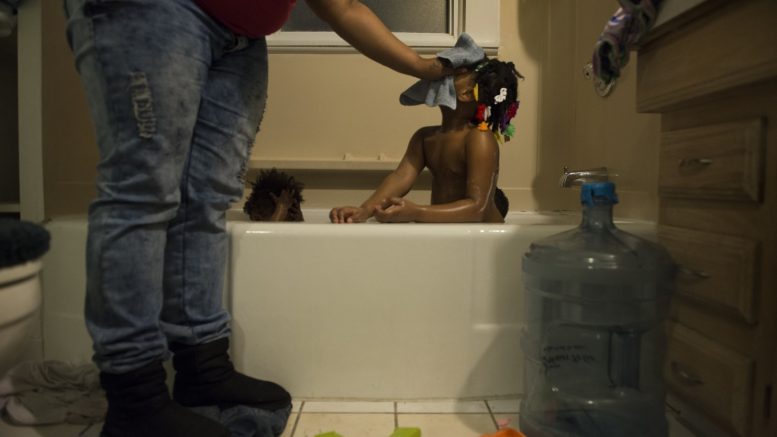Nakeyja Cade bathes her three children in bottled water after her 1-year-old daughter Zariyah Cade (center left) had a blood test scoring high in lead content in Flint, Mich. on March 1, 2016. (Photo by Linda Davidson / The Washington Post)
Public officials failed children in Flint, Mich., by allowing the city’s supply of drinking water to remain contaminated with lead, a known neurotoxin, for 18 months. The government is again falling short, a lawsuit filed Tuesday alleges, by failing to provide those children with educational services that they legally deserve and that could counter the effects of the Flint lead exposure.
The complaint, filed in U.S. District Court in the Eastern District of Michigan, argues that the public school system in Flint is not meeting its legal obligation to screen lead-exposed children for disabilities or provide services and interventions that could make a difference in their ability to learn and thrive. It also alleges that the Michigan Education Department has failed to provide Flint schools, which have cut teachers and other staff in the face of a $10 million deficit, with the resources and funding they need to provide those services.
There are 30,000 children and teenagers under the age of 19 in Flint, and 8,000 of them are younger than 5 and particularly vulnerable to the effects of lead exposure. Lead exposure can result in diminished academic achievement and a greater tendency to be hyperactive, impulsive and aggressive. Without meaningful action soon, the complaint says, children’s opportunities to reach their full potential will be “permanently foreclosed.”
“In the wake of the Flint lead crisis, Flint children face an unprecedented educational and civil rights disaster,” says the 133-page complaint. “It is impossible to overstate the resounding effects of the failure to provide meaningful education opportunities, and to provide them now.”
A spokesman for the state Education Department said that the agency has not yet seen a copy of the complaint; the agency generally declines to comment on pending litigation. Bilal Tawwab, superintendent of Flint Community Schools, also said he could not comment on pending litigation.
“The health and well-being of Flint Community Schools students remains a top priority,” Tawwab said in a statement. A number of additional wrap-around services, support programs and initiatives have been implemented to support students and their families.”
Tawwab acknowledged in February before a congressional committee that his schools need more support to meet students’ profound needs — for lead-free facilities, trained and talented teachers, early intervention and year-round schooling — given the district’s strained budget.
The complaint was filed on behalf of Flint families by the American Civil Liberties Union of Michigan; the Education Law Center, a New Jersey-based public interest law firm; and White & Case, a Manhattan law firm. It seeks class certification to represent all Flint children who were exposed to lead and are — or may be — eligible for special-education services.
“The state, through its own actions, has put every student at risk, and the public education system has to address that,” said Jessica Levin, a lawyer for the Education Law Center, who called the situation in Flint “one of the most pressing and important education civil rights problems in the country.”
The plaintiffs are 15 children, ages 3 to 17, each of whom was exposed to lead in Flint. The complaint alleges that they have been denied the special-education services they need and deserve under the federal Individuals with Disabilities Education Act, the Americans With Disabilities Act and Michigan state law.
Nakiya Wakes is the mother of two plaintiffs, ages 7 and 17. Her younger son, who has been diagnosed with ADHD, showed a rapid rise in behavior problems after being exposed to lead, according to the complaint. His charter school dealt with those problems not by providing him proper support but by suspending him more than 30 times in the 2015-2016 school year, according to the complaint. He has come to hate school, his mother said.
“We didn’t ask to be poisoned, and these kids need their education,” Wakes said.
The plaintiffs also allege that Flint Community Schools has a history of problems with special education. Students with disabilities in Flint are more likely to be segregated than students with disabilities statewide, according to the complaint, and they have suspension and expulsion rates that far exceed the state average.
“For years, Flint has systemically failed to provide adequate services for children with disabilities. On top of that horrific situation these children end up being poisoned with lead in the water,” said Gregory Little, a lawyer with White & Case. “In a lot of ways, it really is a perfect storm.”
The plaintiffs are asking the court to order sweeping changes in Flint schools, including high-quality universal preschool for all 3- to 5-year-olds; enhanced screening of all Flint children to determine their physical, social, emotional and behavioral needs; training for teachers in managing students’ behavior without resorting to physical restraint and seclusion; and regular lead testing of drinking water in Flint schools.
The lawsuit also seeks a comprehensive review of all education plans for children currently identified for special education, to make sure their needs have been properly identified. It asks the court to convene a group that would lay out a comprehensive plan for addressing children’s physical, emotional and behavioral trauma in the aftermath of lead exposure, and for a special monitor to oversee the implementation of that plan over the next seven years.
“For the children of Flint, education is the antidote to the public health crisis they have endured,” says the complaint. “For the thousands of Flint children exposed to lead, their schools must afford them the opportunity to become productive citizens and contributing members of the community, the opportunity they deserve and are entitled to.”
Source: www.washingtonpost.com




